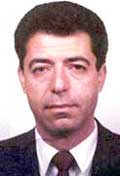|
Hamas-Fatah Clashes…"Risky Power Struggle"
 |
|
Palestinian police officer prevents Hamas spokesman from joining a news conference in Gaza city. (Reuters)
|
Additional
Reporting by Yasser Al Banna, IOL Correspondent
GAZA,
July 20, 2005 (IslamOnline.net & News Agencies) – At least seven
Palestinians were injured Wednesday, July 20, in fresh clashes between
Palestinian security forces and Hamas members despite an agreement
between the two sides to end their escalating in-fighting.
Palestinian
experts and political analysts, on their part, believe the clashes are
"trial balloons" for both Hamas and the Palestinian
Authority to test their ability to impose control in Gaza Strip,
following the planned Israeli withdrawal from the occupied territory.
Hours
after a deal to end fighting between Hamas and the Palestinian
security forces, Hamas members reportedly opened fire at the home of
the Palestinian preventive security chief Rashid Abu Shbak, Agence
France-Presse (AFP) said.
Hamas
members also opened fire at the home of Abdallah Franji, head of the
mainstream Fatah in Gaza.
With
the eruption of new clashes, Palestinian security forces and Hamas
traded accusations as regards who initiated the fire exchange.
Sami
Abu Zuhri, Hamas spokesman, said Palestinian security members had
opened fire on a car containing members of Hamas as they drove past
Abu Shbak's house and that one of Franji's bodyguards also shot at a
Hamas vehicle.
He
maintained that four members of Hamas were wounded in the fire
exchange.
Agreement
The
new clashes erupted few hours after an agreement reached between the
two sides to end their week-long fighting.
Speaking
at a late-night Gaza City news conference early Wednesday, Sofian Abu
Zayda for Palestinian President Mahmoud Abbas's Fatah movement and
Nizar Rayan for Hamas said they would meet again Wednesday to
consolidate their agreement, Reuters reported.
"The
movements have agreed to stop all clashes and violence and end all
armed presence and all issues that may lead to tension between the two
sides," Abu Zaida said.
Two
Palestinian teenagers were killed and scores others wounded in clashes
between Palestinian security forces and Hamas members in Gaza last
week.
The
clashes erupted Thursday night and resumed Friday after Palestinian
interior minister Nasr Yussef put security forces and police on high
alert to "prevent by force if necessary all firing of rockets and
mortars" against Israeli targets.
Retaliating
to Israeli aggressions, Palestinian resistance men fired rockets into
southern Israel last week, killing an Israeli woman, and Palestinian
police then confronted them in an effort to prevent further barrages.
Palestinian
resistance groups said the rocket attack was in retaliation of the
killing of a Palestinian man in an Israeli raid in the West Bank
Thursday, part of an Israeli offensive against Islamic Jihad's attack
at a shopping mall in the Israeli city of Netanya, which left five
Israelis killed.
"Trial
Balloons"

|
|
"Hamas,
by responding to attempts of the security forces to arrest its members,
sends a message that it is a key player," Barghouthi said.
|
Palestinian
experts and political analysts said the recent clashes between the two
sides are only "trial balloons" that aim to assess Hamas'
reaction to attempts of the Palestinian Authority to halt the
resistance attacks against Israeli targets in compliance with foreign
pressures.
"The
US and Israeli pressures on the Palestinian Authority to halt
resistance attacks against Israeli targets and secure the Israeli
withdrawal from Gaza were the main reason behind opening fire by the
security forces at Hamas members," Iyad Al-Barghouthi, professor
of political sciences, told IslamOnline.net Wednesday.
By
responding to attempts of the security forces to arrest its members,
Hamas sends a message that it is a key player in the Palestinian
territories that should play an active political role in the future,
he added.
Pro.
Atef Odwan, head of the Gaza-based Al-Mustaqbal (Future) research
center, agreed.
"Hamas
believes that taking no reaction toward attempts of the security
forces to arrest its members would allow the Palestinian Authority to
repeat such attempts against the resistance men," he said.
PA
Message
Mostafa
El-Sawwaf, Palestinian expert in the Islamic movements' affairs, said
the Palestinian Authority's crackdown on Hamas members is a message to
the western countries that it is moving to halt resistance attacks
against Israeli targets.
"The
stance of the Palestinian Authority is in line with its policy on
warning the resistance factions against violating the shaky truce with
Israel under claims that rocket attacks against Israeli settlements
bring back harms to the Palestinian people and their properties,"
he said.
Palestinian
leader Mahmoud Abbas, struggling to preserve the shaky ceasefire with
Israel, managed to convince resistance factions in March to observe a
"period of calm" conditional on Israel ending its
aggressions against them.
Since
then, the calm has been put to the test several times in view of
continued Israeli violations.
Over
the past three months, many Palestinians were killed and wounded by
Israeli gunfire, drawing retaliatory mortar and rocket attacks from
Hamas and Islamic Jihad fighters on Jewish settlements in the occupied
territories.
Other
political observers believe Israel is actively fueling
inter-Palestinian fighting for internal reasons, mostly related to its
planned withdrawal from Gaza.
On
the one hand, Israeli occupation forces continue targeting resistance
activists, provoking retaliatory measures that include rocket firing.
On the other hand, Israel steps up pressures on the Palestinian
Authority to crack down on resistance factions, chiefly Hamas.
Some
Israeli circles, opposed to the planned Gaza withdrawal, accuse
hawkish Prime Minister Ariel Sharon, of boosting Hamas image as Israel
did to Hezbollah when it withdrew from South Lebanon over 5 years ago.
By
stirring inter-Palestinian fighting, Sharon will be diverting the
spotlight – internally and internationally – to the Palestinians,
according to observers.
|